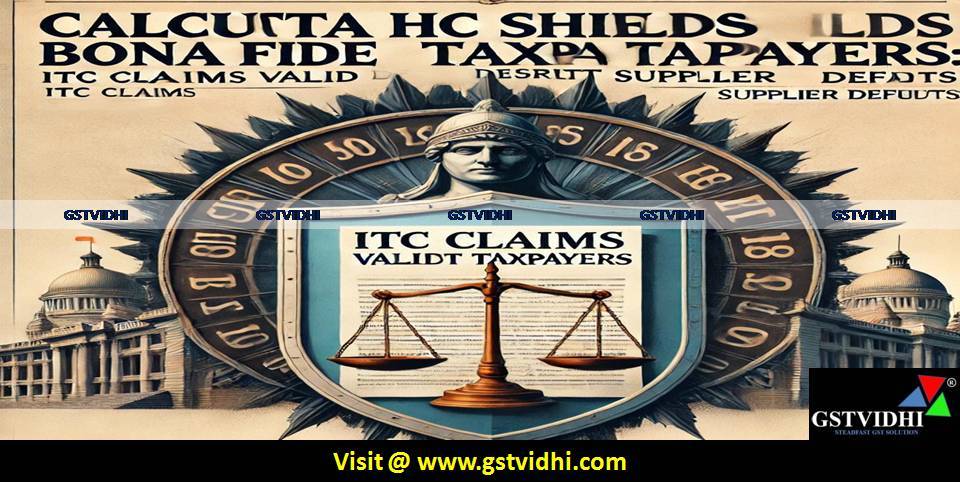
Retrospective
Cancellation of a Supplier GST Registration Doesn’t Automatically Disqualify a
Buyer’s Input Tax Credit (ITC) – Calcutta High Court
By Yogesh Verma (CS/LLB) / 2 min read / GST Case Law
Introduction
The judgment in Jyoti Tar Products Pvt. Ltd. vs. The Deputy Commissioner,
State Tax, Shibpur Charge & Ors. delivered by the Calcutta High Court
on January 14, 2025, explores critical issues under the CGST/WBGST Act, 2017.
The case pertains to the retrospective cancellation of supplier registrations
and its impact on the purchaser’s Input Tax Credit (ITC) claims. The court
highlighted the importance of compliance with Section 16(2) of the GST Act and
the role of procedural fairness in adjudication.
Case Details
- Court: Calcutta High Court
- Bench: Hon’ble Chief Justice T. S. Sivagnanam and Justice
Hiranmay Bhattacharyya
- Case
Number: MAT/2100/2024
- Judgment
Date: January 14, 2025
- Parties:
- Appellant:
Jyoti Tar Products Pvt. Ltd.
- Respondent:
The Deputy Commissioner, State Tax, Shibpur Charge, WBGST, and others
Background of the Case: Jyoti Tar Products Pvt. Ltd., a GST-registered entity, was
served a pre-show cause notice under Section 73(5) of the CGST/WBGST Act on
August 16, 2023. The notice alleged that the appellant availed ITC on
transactions with suppliers whose registrations were retrospectively canceled.
Key Events
1.
Pre-Show
Cause Notice: The notice alleged that the
suppliers were non-existent and their registrations were canceled
retrospectively. It claimed that ITC availed on such transactions violated
Section 16(2).
2.
Replies to
Notices: The appellant submitted a detailed
reply on October 6, 2023, providing tax invoices, e-way bills, bank payment
details, and ledger accounts to establish the legitimacy of purchases. Despite
the submissions, a formal show cause notice was issued on December 26, 2023,
reiterating the allegations.
3.
Adjudication
Order: The adjudicating authority issued
an order on July 10, 2024, rejecting the appellant’s ITC claims without
addressing key issues like the effect of retrospective cancellations and
compliance with Section 16(2).
4.
Appeal to
the High Court: Aggrieved by the adjudication
order and subsequent dismissal of the writ petition on November 11, 2024, the
appellant approached the Calcutta High Court in appeal.
Legal Framework
Section 16(2) of the CGST Act
This section outlines the conditions for availing ITC,
including:
1.
Possession of a valid tax invoice.
2.
Receipt of goods or services.
3.
Payment of tax to the government.
4.
Filing of requisite returns.
Section 74(9) of the CGST Act
Covers the adjudication process for fraud, willful
misstatement, or suppression of facts, with provisions for penalties and ITC
reversals.
Issues Raised
1.
Can retrospective cancellation of a
supplier’s GST registration invalidate ITC claims of a bona fide purchaser?
2.
Did the adjudicating authority
consider compliance with Section 16(2) of the CGST Act?
3.
Was the adjudicating process fair
and in line with principles of natural justice?
Submissions by the Parties
Appellant’s Arguments
1.
Compliance
with Section 16(2): The appellant contended that all
purchases were made when the suppliers’ registrations were active. Submitted
evidence of invoices, e-way bills, and bank payments to demonstrate compliance.
2.
Effect of
Retrospective Cancellation: Argued
that the retrospective cancellation of supplier registrations cannot affect the
purchaser’s ITC if the transaction was genuine.
3.
Precedents
Cited: Relied on Shraddha Overseas
Pvt. Ltd. vs. Assistant Commissioner of State Tax (2022) and LGW
Industries Ltd. vs. Assistant Commissioner (2022), where courts ruled that
bona fide transactions should not suffer due to supplier non-compliance.
Respondent’s Arguments
1.
Supplier
Non-Compliance: The respondent argued that the
suppliers were non-existent and their registrations were canceled, invalidating
the ITC claims.
2.
Statutory
Compliance: Maintained that the appellant
failed to verify the credibility of suppliers, making the ITC claims untenable.
Findings of the Court
1.
On
Retrospective Cancellations: The
court observed that retrospective cancellation of supplier registrations should
not automatically invalidate the purchaser’s ITC if transactions were genuine.
2.
Compliance
with Section 16(2): It noted that the appellant
provided substantial evidence of compliance, including invoices and payment
records.
3.
Adjudication
Process: The court criticized the
adjudicating authority for failing to address key issues, including the
retrospective effect of cancellations and the appellant’s compliance with
Section 16(2).
4.
Natural
Justice: Held that the adjudication lacked
fairness, as the appellant’s submissions were not adequately considered.
Judgment
The Calcutta High Court set aside the adjudication order and
remanded the matter to the Deputy Commissioner for fresh adjudication. The
court directed the adjudicating authority to:
1.
Consider all evidence submitted by
the appellant.
2.
Address the impact of retrospective
cancellations on ITC claims.
3.
Render a reasoned decision in
accordance with law.
The appellant was granted 15 days to file an additional
reply.
Analysis
·
Balance
Between Compliance and Fairness: The
judgment strikes a balance between enforcing GST compliance and protecting the
rights of bona fide taxpayers. It emphasizes that retrospective cancellations
should not unfairly burden genuine purchasers.
·
Importance
of Procedural Fairness: The
court’s emphasis on addressing all submissions and evidence reinforces the need
for procedural fairness in GST adjudication.
·
Precedential
Value: This decision aligns with prior
rulings that ITC claims should not be denied solely due to supplier
non-compliance if the purchaser has adhered to statutory requirements.
Conclusion
The judgment in Jyoti Tar Products Pvt. Ltd. vs. The
Deputy Commissioner, State Tax underscores the importance of protecting
bona fide taxpayers under GST law. It highlights the role of procedural
fairness and the limitations of retrospective cancellations in denying ITC. The
case serves as a significant precedent, ensuring that taxpayers are not
penalized for supplier defaults beyond their control.
Disclaimer: All the Information is based on the notification, circular and order issued by the Govt. authority and judgement delivered by the court or the authority information is strictly for educational purposes and on the basis of our best understanding of laws & not binding on anyone.
Find the Attachment (Press on Click Here )
Click here